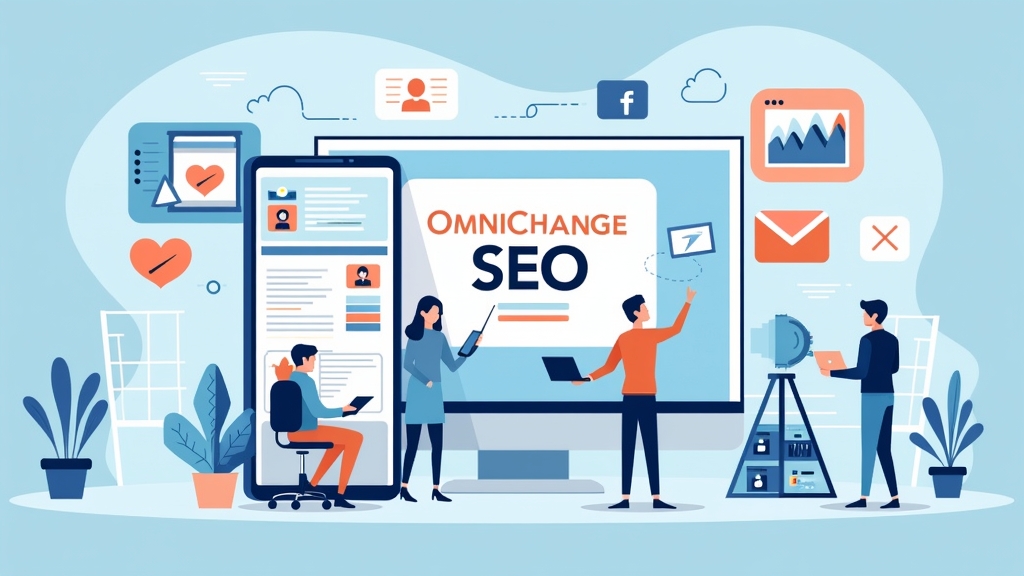Mastering Marketing: Effective Omnichannel SEO Strategies for Success
Introduction
In today’s fast-paced digital world, mastering omnichannel marketing is essential for businesses aiming to connect with their audience effectively. Omnichannel marketing ensures a seamless customer experience across various platforms, making it easier for potential customers to engage with your brand. Understanding how search engine optimization (SEO) fits into this strategy is crucial. SEO in an omnichannel context helps you reach your audience wherever they are, enhancing visibility and driving traffic to your website. This article will explore effective omnichannel SEO strategies that can lead to success in your marketing efforts.
The Foundations of Omnichannel SEO
Defining Omnichannel SEO
Omnichannel SEO refers to optimizing your online presence across multiple channels to create a unified experience for users. Unlike traditional SEO, which focuses on individual platforms like websites or social media, omnichannel SEO considers the entire customer journey. It ensures that no matter where customers interact with your brand—be it through social media, email, or search engines—they receive consistent messaging and quality content.
Key Components of a Successful Omnichannel Strategy
A successful omnichannel strategy includes several key components: consistency in branding, understanding customer behavior, and utilizing data analytics. First, maintaining a cohesive brand image across all channels builds trust and recognition among consumers. Second, knowing how customers move between different touchpoints allows you to tailor content effectively. Lastly, leveraging data analytics helps track performance and refine strategies based on real-time insights.
Analyzing Your Target Audience
Understanding Customer Journeys Across Channels
To implement effective omnichannel SEO strategies, it’s vital to understand how customers navigate through various channels during their buying journey. Many consumers start their research online before making purchases in-store or vice versa. By mapping out these journeys—identifying key touchpoints—you can optimize each interaction point for better engagement.
Creating Buyer Personas for Better Targeting
Creating detailed buyer personas is another critical step in analyzing your target audience. These personas represent different segments of your market based on demographics, behaviors, and preferences. By understanding who your ideal customers are and what they need at each stage of their journey, you can craft targeted content that resonates with them across all channels.
Crafting a Cohesive Brand Message
Consistency Across All Platforms
Consistency is key when crafting a cohesive brand message in an omnichannel approach. Your tone of voice should remain uniform whether you’re posting on social media or sending emails. This consistency reinforces brand identity and makes it easier for customers to recognize and trust your business.
Tailoring Content for Different Channels
While maintaining consistency is important, tailoring content specifically for each channel enhances user engagement further. For example, short videos may work well on platforms like Instagram while longer articles might be more suitable for blogs or LinkedIn posts. Adapting the format while keeping the core message intact ensures that you meet the expectations of users on different platforms.
Optimizing Content for Multiple Channels
Best Practices for Website SEO
Optimizing your website remains fundamental in an omnichannel strategy because it often serves as the hub of information about your business. Ensure that pages load quickly and are mobile-friendly since many users access websites via smartphones today. Incorporating relevant keywords naturally throughout the site also boosts visibility in search results.
Leveraging Social Media for Enhanced Visibility
Social media plays a significant role in driving traffic back to your website while promoting engagement directly within those platforms themselves. Share valuable content regularly but also encourage conversations by responding promptly to comments or messages from followers.
Email Marketing and Its Role in Omnichannel Strategies
Email marketing continues being one of the most effective methods within an omnichannel framework due largely its ability personalize communication directly with interested audiences based upon previous interactions they’ve had with both products/services offered by businesses along side any promotions available at given times throughout year!
Utilizing Data and Analytics
Tracking Performance Across Channels
Monitoring performance across all channels provides insights into what works best regarding customer engagement levels as well as conversion rates achieved through various campaigns launched over time! Use tools like Google Analytics combined alongside social media metrics so you can see where improvements could be made moving forward!
Tools for Measuring Omnichannel Success
Several tools exist specifically designed help measure success achieved via implementing these types strategies including HubSpot & SEMrush which offer comprehensive reporting features allowing marketers analyze effectiveness campaigns run previously against set goals established beforehand ensuring continual growth occurs consistently over time!
Adapting to Evolving Trends in Digital Marketing
Staying Ahead with Mobile Optimization
With more people using mobile devices than ever before accessing internet-based services; optimizing sites/apps accordingly becomes paramount if hope retain competitive edge! Focus not only improving loading speeds but also ensuring layouts responsive enough accommodate varying screen sizes encountered daily by users everywhere!
The Role of Voice Search in Omnichannel SEO
Voice search technology has rapidly gained popularity thanks advancements made AI-driven assistants such Siri/Alexa etc., meaning incorporating conversational phrases/keywords into existing content now necessary ensure discoverability remains high amongst those utilizing this feature regularly!
Conclusion
In summary; mastering effective omnichannel strategies requires understanding importance aligning efforts seamlessly together while focusing heavily around optimizing experiences provided throughout every stage involved within consumer journeys taken place today! As trends continue evolve rapidly; staying informed about latest developments surrounding technologies utilized will ultimately determine future successes achieved long-term basis moving forward too!
📢 Explore More: Continue Your Journey!
If this article helped you understand more about integrated marketing approaches; check out “The Power of Personalization: How Tailored Marketing Boosts Engagement!” It covers powerful insights into creating personalized experiences that resonate deeply with audiences across diverse platforms.














![NEEWER 55W 18"/45cm Ring Light Kit [New Version], 5600K Dimmable ...](https://m.media-amazon.com/images/I/414QLqvZWLL._AC_.jpg)








